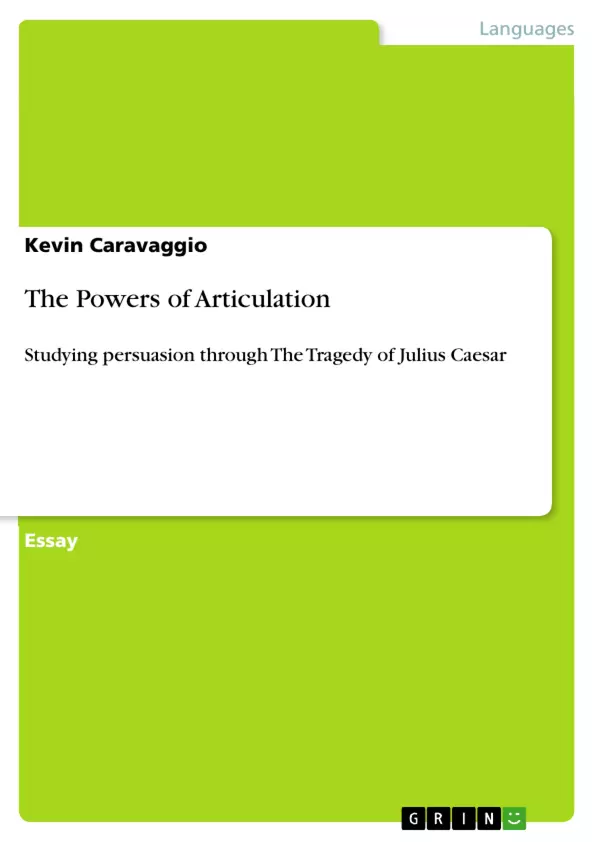Persuasion is a massive force. Understanding it is thus key to wielding a formidable power. William Shakespeare exposes persuasion's strength in his play, The Tragedy of Julius Caesar. What will we learn about tact by examining just one of the masterful examples of persuasion featured in Shakespeare's work?
Inhaltsverzeichnis (Table of Contents)
- The Powers of Articulation
- False Cause and Effect
- Inductive Reasoning
- Bandwagon Appeal
- Either/Or Reasoning
- Name Calling
Zielsetzung und Themenschwerpunkte (Objectives and Key Themes)
This analysis explores the persuasive techniques employed by Cassius in Shakespeare's Julius Caesar, focusing on his successful recruitment of Casca into the conspiracy against Caesar. It examines how Cassius's use of rhetoric impacts Casca's perspective and ultimately influences his decision to join the plot.
- The power of persuasion in shaping individual actions and political events.
- The effectiveness of various persuasive techniques, including false cause and effect, inductive reasoning, bandwagon appeal, either/or reasoning, and name-calling.
- The portrayal of Cassius as a master manipulator, using rhetoric to influence others for personal gain.
- The role of rhetoric in influencing public opinion and shaping political discourse.
- The significance of understanding persuasive techniques in analyzing historical and contemporary events.
Zusammenfassung der Kapitel (Chapter Summaries)
- The Powers of Articulation: This chapter introduces the concept of persuasion as a powerful tool for influencing others, drawing upon examples from Shakespeare's Julius Caesar. It highlights the central theme of the analysis, focusing on Cassius's successful persuasion of Casca.
- False Cause and Effect: This chapter examines Cassius's use of false cause and effect as a persuasive tactic. He links the strange weather phenomenon to supernatural warnings against Caesar, effectively creating an atmosphere of fear and instability, swaying Casca's opinion.
- Inductive Reasoning: Here, the analysis explores Cassius's employment of inductive reasoning. He compares the terrifying weather to an unnamed individual, leading Casca to infer that he is referring to Caesar, subtly shaping Casca's perception.
- Bandwagon Appeal: This chapter delves into the use of bandwagon appeal by Cassius. He asserts that the spirit of all Romans is humiliated under Caesar's rule, appealing to Casca's sense of national pride and creating a perception of universal discontent.
- Either/Or Reasoning: This chapter examines Cassius's use of either/or reasoning. He presents Casca with a stark choice: either submit to Caesar's tyranny or face death, driving Casca towards the path of rebellion.
- Name Calling: This chapter concludes the analysis by exploring Cassius's use of name-calling. He uses derogatory language to demean Caesar, further alienating Casca from him and strengthening his resolve to join the conspiracy.
Schlüsselwörter (Keywords)
This analysis explores the persuasive techniques used by Cassius in Shakespeare's Julius Caesar, specifically focusing on the successful recruitment of Casca for the plot against Caesar. The analysis delves into the effectiveness of various methods, including false cause and effect, inductive reasoning, bandwagon appeal, either/or reasoning, and name-calling. It highlights the role of rhetoric in shaping individual actions and influencing public opinion, demonstrating how Cassius, as a master manipulator, leverages these techniques for personal gain.
Frequently Asked Questions
How does Cassius use persuasion in Julius Caesar?
Cassius uses a variety of rhetorical techniques, such as false cause and effect and name-calling, to manipulate others like Casca into joining the conspiracy against Caesar.
What is "Bandwagon Appeal" in the context of the play?
It is a technique where Cassius suggests that all Romans are suffering under Caesar, appealing to a sense of collective humiliation to make rebellion seem like a universal necessity.
What is "Either/Or Reasoning"?
Cassius presents a false dilemma, forcing Casca to choose between submitting to tyranny or taking action, leaving no room for middle ground.
How is "False Cause and Effect" used?
Cassius attributes strange weather and supernatural events to Caesar’s rise to power, creating fear to justify the assassination plot.
Why is rhetoric important in political discourse?
Shakespeare demonstrates that the power of articulation can shape public opinion and drive historical events, often through manipulation rather than truth.
- Quote paper
- Kevin Caravaggio (Author), 2012, The Powers of Articulation, Munich, GRIN Verlag, https://www.grin.com/document/194114



